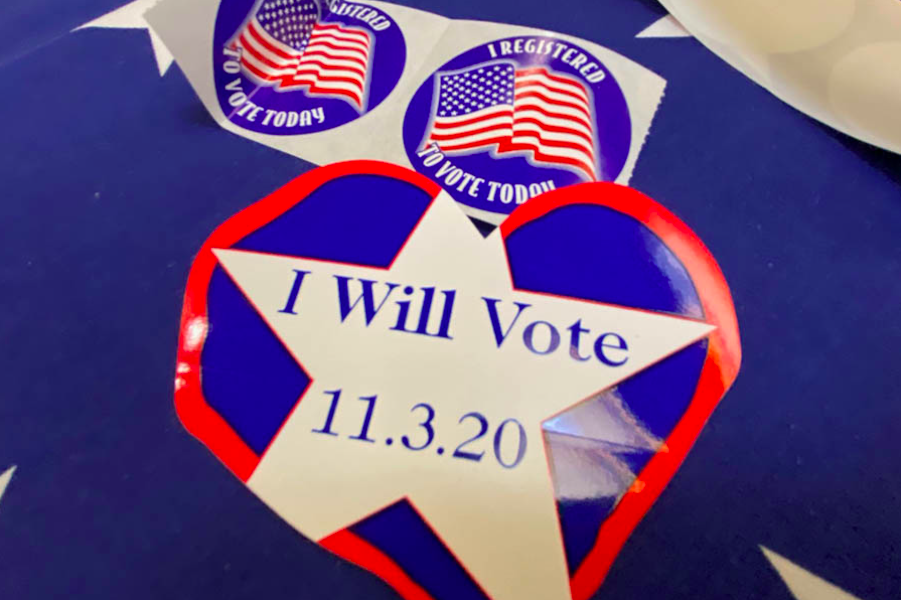The Fight for the Right
The year 2020 marks one hundred years since the ratification of the 19th Amendment which gave women the ability to vote.
PHOTO | Maleah Downton
The League of Women Voters registered students to vote Feb. 24 in the Grande Salle. This year marks the hundredth anniversary for women’s suffrage with the ratification of the 19th amendment.
It has been one hundred years since the 19th Amendment, which granted women the right to vote, was ratified Aug. 18, 1920.
General key women who shifted the game were Elizabeth Cady Stanton, Susan B. Anthony, Alice Paul, and many others.
Stanton was an important part of the Seneca Falls Convention which brought national attention to the women’s suffrage movement. The Declaration of Sentiments was written at the convention and expressed the grievances of women and their goals for this movement. Anthony, accompanied by Stanton, traveled across the country to give speeches about the suffrage movement. Anthony and Stanton split from the other suffragists and soon formed the National Woman’s Suffrage Association.
Paul was yet another key figure in the women’s suffrage movement, picketing with one thousand other women for 18 months in front of the White House during Woodrow Wilson’s presidency.
Students in Mary Murphy’s American History class watched the movie “Iron Jawed Angels” to learn about the suffrage movement.
“‘Iron Jawed Angels’ is a dramatization of the story of Alice Paul and Lucy Burns, two suffragettes and their push to the top of the suffrage movement,” Murphy said, “Having the girls watch a movie about it is more engaging than reading pages in their textbooks.”
With only one more state needed to ratify the amendment, 24-year-old Harry Burn, changed his vote to an approval. By Aug. 18, 1920, the 19th Amendment was passed and the 72-year battle was finally won.
“I found the movie ‘Iron Jawed Angels’ to be very empowering,” junior Lia Concannon said, “because it showed what women had to do to fight for their right to vote. The scene when they went on a hunger strike in the prison included force-feeding which was very traumatic. Most people don’t know that side of the story.”
Now, one hundred years later, anyone can vote regardless of race or gender. African American women, however, had to go the extra mile after the 19th Amendment was passed. Many states still passed laws that limited African American freedoms until the Voting Rights Act passed in 1965.
“We need to continue to remind them about the power of women and how they’re their own best agents for change,” Murphy said.
Jean Peters Baker leads Jackson County’s Prosecutor’s Office and is chair of the Missouri Democratic Party.
“Being apart of the League of Women Voters was one of the most influential things I’ve done to better understand women’s role in elections,” Peters Baker said, “We were encouraging women not only to vote, but to run for office. The right to vote is critical.”
According to the Center for American Women and Politics, women tend to go to the polls more. With 81.3 million women votes and only 71.7 million men voters, the gap is clear.
“No matter how busy you are, if this is your first year being able to vote, go do it,” Peters Baker said, “Don’t let anyone tell you how to vote, it comes from your own conscious. It’s your first true participation in government.”
The upcoming election is approaching in November and many students are voting for the first time. Students like junior Grace Dobbels are excited to finally be able to have their voices heard.
“I think it’s definitely important for the younger generations to vote as soon as they can,” Dobbels said, “I’m excited to finally be a part of the big decision making.”
In celebration of Women’s History month and the one-hundredth anniversary of women’s suffrage, Le Journal dedicates issue five to women with the special edition: The Women’s Issue.



